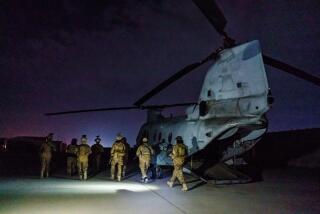Victory in Iraq Shows Signs of Unraveling
- Share via
Is President Bush’s victory in Iraq coming undone like a cheap cowboy boot? Let’s look at some of the unraveling stitches.
First, there’s the situation on the ground in Iraq. After a series of attacks on GIs, the American “peacekeepers” adopted the same modus operandi they used in Bosnia: Forces have been under orders to travel as little as possible. It’s especially critical to avoid casualties now, as body bags might upstage the administration’s declare-victory-and-let’s-cut-taxes blitz. Of course, the problem is that not much policing -- let alone nation-building -- gets done.
Meanwhile, as the U.S. shuffles the bureaucratic players into their various boxes at the Office of Reconstruction and Humanitarian Assistance, the Shiites are mobilizing. The multiple factions of Shiite Islam don’t agree on much, except that the United States should leave. In the past, colonialists kept the Shiites under control through a divide-and-conquer strategy. But for the U.S. to be so Machiavellian, it will need Americans who speak Arabic, and those are in short supply in Baghdad.
Yet in the Muslim world, to ignore a problem is not to make it go away. The Times reported Tuesday that Afghan President Hamid Karzai, in despair over his inability to control provincial warlords, is considering asking Washington to crush his rivals. “We need to take serious steps or this government is doomed to fail,” said one Karzai aide. During a year and a half of U.S. occupation of Afghanistan, Americans have never stopped operations against the Taliban, but it would be a huge escalation if Americans started fighting Afghans on behalf of “our” Afghans.
Second, there’s the mysterious matter of the weapons of mass destruction. A headline in USA Today said it all: “U.S. begins to downplay hunt for banned weapons.” The article notes the “before” and “after” quotes of top Bush people. Before the war: chapter-and-verse specifics about the location of Saddam Hussein’s WMDs. After: vague calls for patience.
Third, there’s the rest of the terror-ridden region. Another Times headline Tuesday read, “Arabs Feel Let Down by Powell: Disappointment rises over U.S. failure to get Israel to accept key elements of ‘road map.’ ” Washington may largely be ignoring this because Mideast Arabs don’t vote in the U.S., but other democracies are paying attention as the Israelis and Palestinians pick each other off by ones and twos; in Britain, Clare Short, a prominent Cabinet minister, resigned, denouncing Tony Blair’s foreign policy. And when we get around to letting the Iraqis vote, they might hold our failure to help the Palestinians against us -- and our troops.
The recent terror bombing in Saudi Arabia will only accelerate the decline of American influence there. The U.S. had already announced a withdrawal of troops from the kingdom; now, a similar exodus of American civilians is likely. So what will happen when Saudi Arabia, home to a quarter of the world’s oil, as well as the spiritual capitals of Islam, is let adrift in the shifting sands of Islamopolitics? Also, how ‘bout that truck bombing in Chechnya, not so far north of Iraq? The Russians have been trying to subdue the Muslim Chechens for more than two centuries, and they still don’t have the hang of it.
Fourth, on the home front, the web spun by the Bush administration is being unwoven. Sen. Bob Graham (D-Fla.), former chairman of the Intelligence Committee, accuses the White House of a “cover-up” over 9/11.
To be sure, Graham is running for president, but wannabe Woodwards and Bernsteins are on the Pulitzer trail. And though it’s impossible for anyone not living in France to imagine that the Bush administration knew about 9/11 in advance, it’s not hard to imagine that a Bushie or two missed a clue. Moral clarity may be admired, but intelligence myopia that perhaps failed to prevent the deaths of thousands will not be easily excused.
It’s likely that these stitches won’t unravel completely until after the 2004 election. And that’s good news for Bush.
More to Read
Sign up for Essential California
The most important California stories and recommendations in your inbox every morning.
You may occasionally receive promotional content from the Los Angeles Times.













